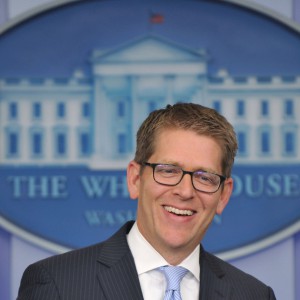They Know What They’re Doing, And They Think It’s Funny

UPI FILE
The Obama White House has attempted to stake a claim as the home of a Presidential Administration that grants the American people an “an unprecedented level of openness in government.” But the Administration’s routine unwillingness to disclose concrete information to journalists, the use of its own media assets to disseminate information while circumventing press scrutiny and the broader Federal government’s increasingly aggressive surveillance and prosecution of journalists and whistle-blowers all tell a story far different than the fairy tale the President would like Americans to believe.
The most transparent aspect of President Barack Obama’s Administration is how obviously averse it is to the press. It exhibits — dare it be written — an almost Communistic dedication to control the President’s message, how it’s interpreted and, most importantly, Obama’s image. To put it overly simply — and to provide a measuring stick in the form of another recent President who had his own special relationship with the press — if Obama chokes on a pretzel, no one in America will ever know.
The Obama Administration has made lofty promises about open government — but has prosecuted whistle-blowers who leak information painting the Administration in an unfavorable light more aggressively than any other in history.
Jeff Bachman, a professorial lecturer in Human Rights at the School of International Service at American University, noted in an op-ed for The Hill in May: “The Obama administration has sent a clear message. Government officials and journalists who wish to work together to create news stories through the leak of classified information that portray the president and his administration in a positive light should have no fear. And to the journalists and whistle-blowers thinking about publishing that other kind of classified information, be prepared to have your emails read, your phones tapped without your knowledge and your life and career turned upside down.”
And while the Administration isn’t busy making journalists and civically minded witnesses of government wrongdoing — potential leakers — worry over the potential consequences of running afoul of the Federal government in the public interest, it is making it increasingly easy for members of the press to go on autopilot and to provide Americans with an Administration-approved message.
The Obama Administration has been praised for embracing social media and the Internet as a key vehicle for providing the public with information about the Executive Office. But a casual and obviously necessary embrace of 21st century technology to communicate with an increasingly always-connected public has not been the Administration’s goal. Instead, the Obama Administration has simply done as much as it can to cut out the middle man, the trained journalist who knows the difference between a marketing ploy and an honest response, so that information is dropped without journalistic vetting into the email inboxes or onto the social media pages of average Americans.
In a recent POLITICO piece, political journalists Jim VandeHei and Mike Allen offered a survey of the Obama Administration’s strategy for insulating itself from journalists, writing: “One authentically new technique pioneered by the Obama White House is government creation of content — photos of the president, videos of White House officials, blog posts written by Obama aides — which can then be instantly released to the masses through social media. And they are obsessed with taking advantage of Twitter, Facebook, YouTube and every other social media forum, not just for campaigning, but governing. They are more disciplined about cracking down on staff that leak, or reporters who write things they don’t like.”
The press, notably a number of New York Times journalists who were targeted for government investigations for their journalistic efforts, have complained about the current White House’s stymying of the press’ ability to cover the President over the past several months. And, in late October, New York Times photographer Doug Mills summed up the current White House media strategy succinctly in a conversation with Administration Press Secretary Jay Carney.
According to National Journal, Mills, accompanied by other members of the White House Correspondents’ Association, expressed his disdain for the White House’s practice of denying Presidential access to photographers and videographers not employed by the Administration.
“You guys,” Mills said, “are just like TASS.”
TASS stands for Telegraph Agency of the Soviet Union. It is the state-run news agency that provides all of those manly pictures of Russian President Vladimir Putin flying with geese and wrestling bears.
Carney, a former Moscow reporter for TIME, promptly laughed in the journalist’s face.
“Oh, so now we’re like Stalin?”
According to the Journal’s accounting of events, Olivier Knox, a Yahoo reporter and White House correspondent, interjected, “It’s not funny, Jay.”
But that’s just classic Carney.
Watch any White House press briefing where Carney is asked a series of tough questions by journalists, and it’s impossible to miss the verbal gymnastics the press secretary employs to avoid providing answers — not to mention the obvious glee he takes in his deceptive abilities. And after any one of those exchanges that result in the viral flood of online videos titled in ways like “Reporter Skewers Carney On Obama Untruths,” the White House sets in motion the wheels of its own taxpayer-funded press machine. Its Twitter feed is filled with marketing copy, its websites wallpapered with cheery pro-Obama — truthful or not — infographics and its various tax-exempt propagandist allies crank out pro-White House copy complete with White House-approved talking points before the reporters sitting in the room with Carney are even able to make heads or tails of his usually noncommittal language and endless referrals to other bureaucratic officials.
Knox is right. That the Administration is so comfortably able to control the message certainly isn’t funny, it’s frightening.
No comments:
Post a Comment
Thanks for commenting. Your comments are needed for helping to improve the discussion.